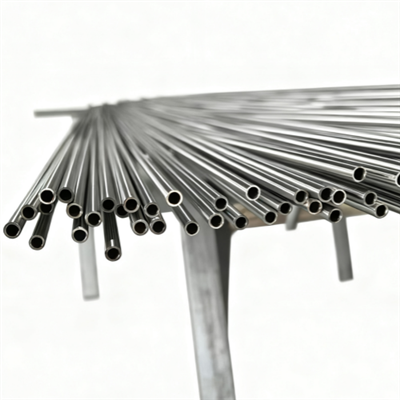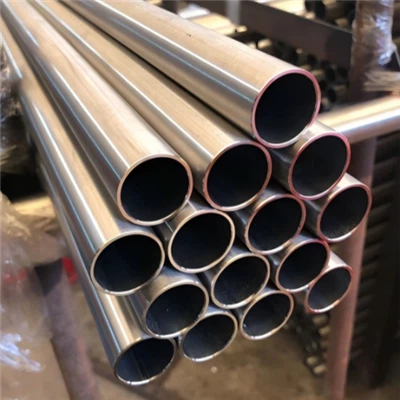Hey there! As a supplier of Alloy 825 pipes, I often get asked about the certification requirements for these pipes. So, I thought I'd put together this blog post to shed some light on the topic.
Alloy 825 is a nickel-iron-chromium alloy with additions of molybdenum, copper, and titanium. It's known for its excellent corrosion resistance in a wide range of environments, including both reducing and oxidizing acids, as well as in seawater. Because of these properties, Alloy 825 pipes are used in various industries such as chemical processing, oil and gas, and marine applications.


Industry Standards and Specifications
The first thing to understand about the certification requirements for Alloy 825 pipes is that they need to meet certain industry standards and specifications. These standards ensure that the pipes have the right chemical composition, mechanical properties, and dimensional accuracy.
One of the most common standards for Alloy 825 pipes is ASTM B423. This standard covers seamless and welded Alloy 825 pipes for general corrosion-resistant service. It specifies the chemical composition limits for elements like nickel, chromium, molybdenum, copper, and titanium. For example, the nickel content should be between 38% and 46%, chromium between 19.5% and 23.5%, and so on.
Another important standard is ASME SB423. ASME standards are often used in the construction of pressure vessels and piping systems in the United States. Pipes that meet ASME SB423 are suitable for use in high-pressure and high-temperature applications.
In addition to these American standards, there are also international standards like ISO 6207. ISO standards are recognized globally and are often used in international trade. Pipes that meet ISO 6207 can be used in a wide range of applications around the world.
Chemical Composition Certification
To prove that our Alloy 825 pipes meet the required chemical composition, we conduct chemical analysis tests. These tests are usually done using techniques like spectroscopy. Spectroscopy can accurately measure the amount of different elements in the alloy.
Once the tests are completed, we issue a chemical composition certificate. This certificate shows the actual chemical composition of the pipes and verifies that they fall within the limits specified by the relevant standards. This certificate is crucial for our customers as it gives them confidence in the quality of the pipes they are buying.
Mechanical Properties Certification
Alloy 825 pipes also need to meet certain mechanical properties requirements. These properties include tensile strength, yield strength, and elongation. Tensile strength is the maximum stress that a material can withstand before it breaks, while yield strength is the stress at which the material begins to deform plastically. Elongation measures how much the material can stretch before breaking.
We perform mechanical tests on our pipes to determine these properties. For example, we use a tensile testing machine to measure the tensile and yield strengths. The results of these tests are recorded in a mechanical properties certificate. This certificate shows that our pipes have the required strength and ductility for their intended applications.
Dimensional Accuracy Certification
Dimensional accuracy is another important aspect of Alloy 825 pipes. The pipes need to have the right diameter, wall thickness, and length. Any deviation from the specified dimensions can affect the performance of the pipes in their applications.
We use precision measuring tools like calipers and micrometers to check the dimensions of our pipes. If the pipes meet the dimensional requirements, we issue a dimensional accuracy certificate. This certificate verifies that the pipes have the correct size and shape.
Other Certifications
In addition to the above certifications, there are other certifications that may be required depending on the application. For example, if the pipes are going to be used in the oil and gas industry, they may need to meet NACE MR0175/ISO 15156 standards. These standards are related to the resistance of materials to sulfide stress cracking in sour environments.
We also offer third-party inspection services. A third-party inspector can come to our facility and conduct independent tests and inspections on our pipes. If the pipes pass these inspections, the third-party inspector issues a certificate. This certificate can add an extra layer of credibility to our products.
Comparison with Other Alloys
It's worth noting that there are other alloys that are also used in similar applications as Alloy 825. For example, Inconel 625 UNS N06625 is another popular nickel-based alloy. It has excellent corrosion resistance and high strength at elevated temperatures. Hastelloy C22 UNS N06022 is also known for its outstanding corrosion resistance in a wide range of aggressive environments. And Inconel 718 UNS N07718 is often used in high-stress applications due to its high strength and good fatigue resistance.
However, Alloy 825 has its own unique advantages. It offers a good balance of corrosion resistance, mechanical properties, and cost. This makes it a popular choice for many applications.
Why Choose Our Alloy 825 Pipes
As a supplier, we take pride in providing high-quality Alloy 825 pipes. We have a strict quality control system in place to ensure that all our pipes meet the required certification requirements. Our experienced team of technicians and engineers is dedicated to producing pipes that are reliable and perform well in their applications.
We also offer competitive pricing and excellent customer service. We understand that our customers have different needs, and we are willing to work with them to find the best solutions. Whether you need a small quantity of pipes for a special project or a large order for a major industrial application, we can meet your requirements.
Let's Connect
If you're interested in our Alloy 825 pipes or have any questions about the certification requirements, please don't hesitate to reach out. We're here to help you make the right choice for your project. Whether you need more information about our products or want to discuss a specific application, we're just a message away.
References
- ASTM B423 - Standard Specification for Seamless and Welded Nickel-Iron-Chromium-Molybdenum-Copper Alloy (UNS N08825 and UNS N08221) Pipe and Tube for General Corrosion-Resistant Service
- ASME SB423 - Specification for Seamless and Welded Nickel-Iron-Chromium-Molybdenum-Copper Alloy (UNS N08825 and UNS N08221) Pipe and Tube for General Corrosion-Resistant Service
- ISO 6207 - Seamless and welded tubes of nickel and nickel alloys - Dimensions and masses per unit length
- NACE MR0175/ISO 15156 - Petroleum and natural gas industries — Materials for use in H2S-containing environments in oil and gas production






